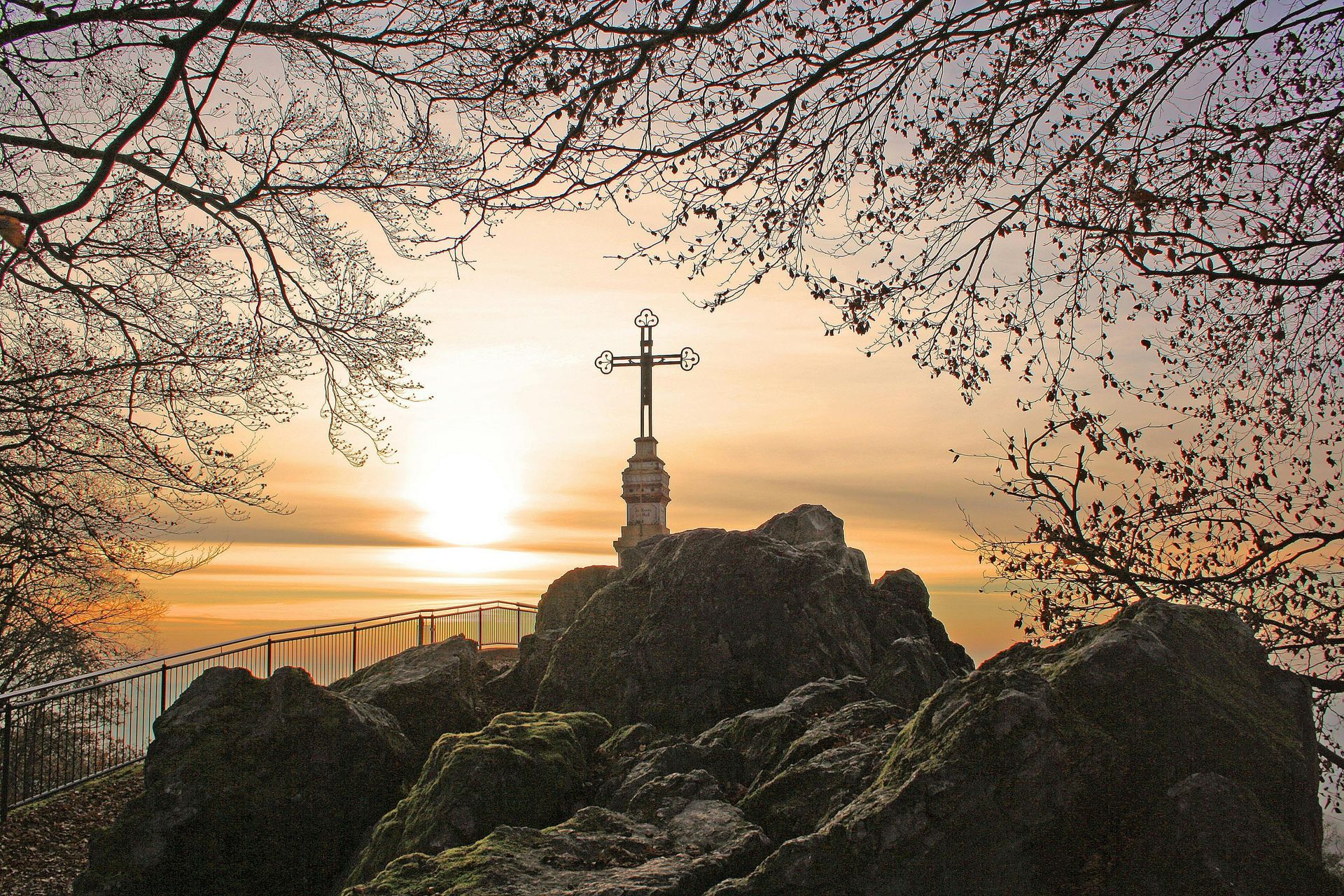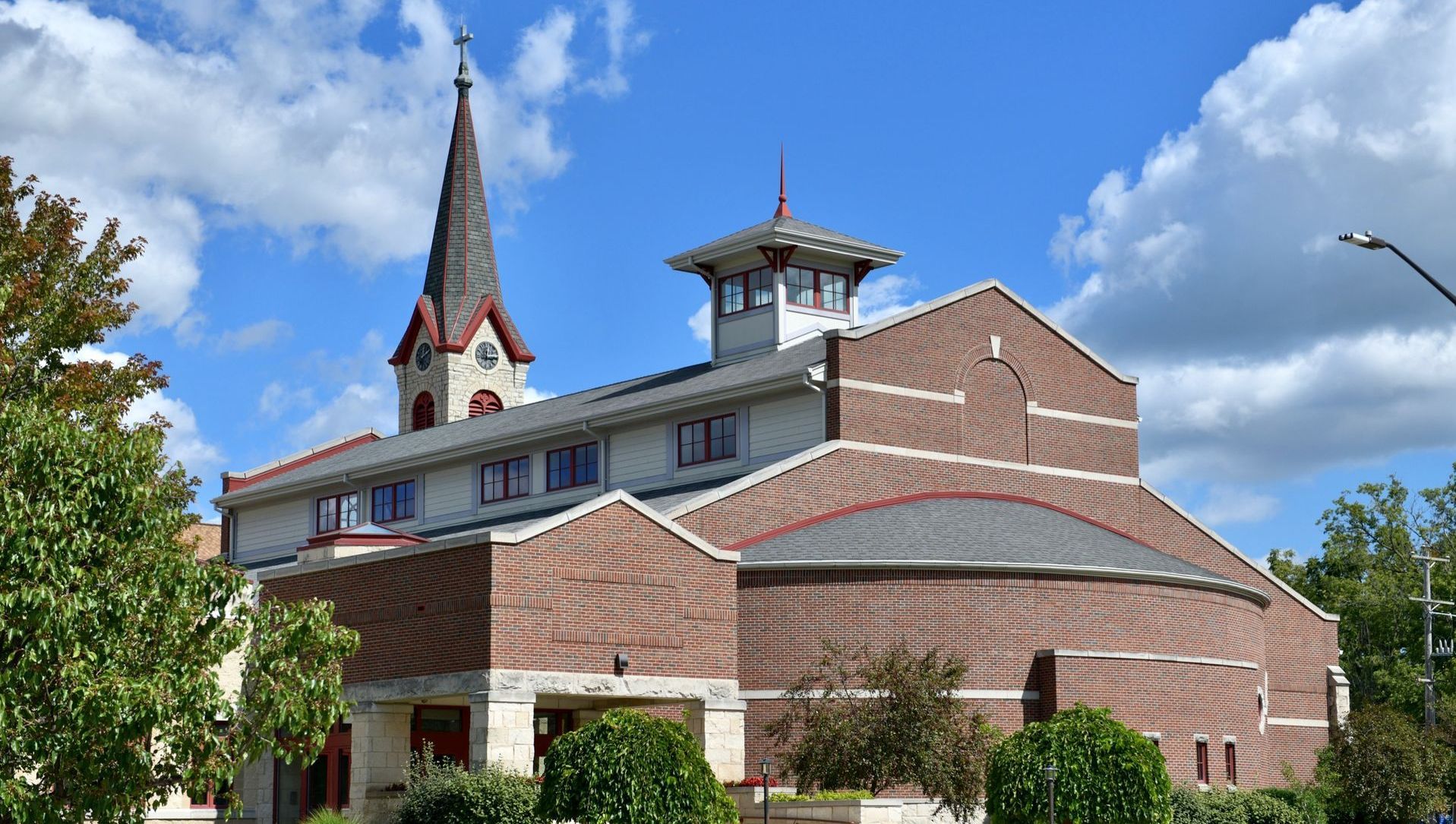Thanksgiving Message
Jenny Drzewiecki • November 25, 2025
The body content of your post goes here. To edit this text, click on it and delete this default text and start typing your own or paste your own from a different source.

On the Second Sunday of Lent, the Church invites us to reflect on the Transfiguration of the Lord. In the Gospel, Jesus takes Peter, James, and John up Mount Tabor. There, before their eyes, He is changed. His face shines, and His clothes become dazzling white (Mark 9:3). For a moment, the disciples see His divine glory. This Gospel helps us understand what Lent is about. Lent is like climbing a mountain. It takes effort. We pray more. We fast. We try to change bad habits. Sometimes it feels difficult. But just as the disciples saw the glory of Jesus at the top of the mountain, we know that our Lenten journey leads to the joy of Easter. Beyond sacrifice, there is light. Beyond effort, there is peace – a peace that the world cannot give. The Transfiguration also reminds us of our final goal. One day, we hope to share in Christ’s glory in heaven. Lent is not only about giving something up. Lent is about allowing God to change us. Little by little, He wants to transform our hearts so that we reflect His love and His peace. Moses and Elijah appear with Jesus on the mountain. Both met God in the desert. The desert in the Bible is a place of silence, prayer, and trust. During Lent, we are invited to enter our own “desert.” This may simply mean turning off the television, putting aside the phone, spending a few quiet minutes in prayer, or coming to church for extra time with the Lord. We need quiet space to hear God’s voice and to receive the peace that only He can give. You may notice that our church decorations reflect this desert theme. Even the empty baptistery reminds us that Lent is a time of waiting and longing. The desert teaches us that real peace does not come from comfort, money, or success. It comes from being close to God. When Peter sees Jesus transfigured, he says, “Rabbi, it is good that we are here.” He wants to stay. He wants to build tents and remain in that beautiful moment. We understand him. When we feel close to God, when we experience peace in prayer, we want it to last forever. But Jesus leads the disciples back down the mountain. They must return to daily life. This is important for us. Our prayer and Lenten sacrifices are not meant to separate us from the world, but to help us love the world better. If our prayer brings us true peace, we will become more patient, more forgiving, more generous. We will bring Christ’s peace into our families, workplaces, and parish. As we continue our Lenten journey, let us ask the Lord to transform us. May this season help us experience the peace that the world cannot give – the peace that comes from knowing we are loved by God. Let us pray for one another during this holy season. Fr. Andrzej

Last Wednesday, we began the holy season of Lent. During the Ash Wednesday liturgy, we blessed and distributed ashes to all who came forward. This ancient ritual, accompanied by the words, “Remember that you are dust, and to dust you shall return,” carries a deep and beautiful meaning for us. For some Catholics, Lent and ashes can feel heavy. They may associate them only with repentance, sacrifice, and conversion, and therefore see this season in a negative light. Yet in truth, the ashes and the words spoken over us contain a message that is not only serious – but also hopeful, tender, and deeply encouraging. These words come from the Book of Genesis (3:19). After Adam and Eve left the Garden of Eden, God spoke to them in a moment marked by human weakness and failure. But even then, God’s words were not a rejection. They were a reminder. God had created them in His image and likeness. Their dignity did not disappear because of sin. They were formed from the soil of Paradise, and Paradise was created for them. The Garden of Eden – our true and eternal home – remains humanity’s destiny. When God says, “You are dust,” He reminds them where we come from. And when He says, “To dust you shall return,” He points them toward where they belong: back to Him. Even outside of Eden, God never abandoned His children. He continues to wait, to call, and to lead us home. This promise was not only for the first humans. It is for each of us. It is no coincidence that the Church places these words at the very beginning of Lent. When we truly understand them, we begin to see Lent not as a season of gloom, but as a journey back home. The words spoken on Ash Wednesday may be among the most honest and loving words God speaks to humanity. They remind us of our fragility – but even more, they remind us of our dignity and our destiny. With this hope in our hearts, we can enter Lent with renewed enthusiasm. Our prayer, fasting, and almsgiving are not burdens, but rather are steps on the path that leads us back to our heavenly home. Each small sacrifice, each act of charity, each quiet prayer becomes a way of cooperating with God’s loving work within us. May this Lent be a meaningful and grace-filled journey for each of us, and for our entire parish community of St. Martin of Tours Parish. Fr. Andrzej

In today’s Gospel, Jesus speaks words that are both encouraging and challenging: “I have come not to abolish the Law but to fulfill it.” With these words, He reminds us that God’s commandments are not meant to trap us in a list of rules, but to guide us toward true life. For many people, the Law can sound like a series of do’s and don’ts, something to be followed mainly out of fear of punishment. Jesus invites us to something much deeper. He teaches that it is not enough to obey God only on the outside. What truly matters is the heart. Avoiding wrongdoing is important, but Jesus calls us further – to heal anger, to forgive, and to be faithful not only in our actions but also in our thoughts and intentions. The Law God has given is good and holy, but it bears fruit only when it is welcomed into our hearts. When we live God’s commandments out of love, they no longer feel like a burden. Instead, they become a path that shapes our choices, strengthens our relationships, and guides the way we treat one another. Love – not fear – is the true reason for living God’s law. We can see this in everyday life. The deepest reason to remain faithful in marriage is love for one’s spouse, not fear of breaking a commandment. The true reason to worship God and come to church on Sunday is love of God, not fear of failing in our obligation. When love, rather than fear of punishment, becomes our motivation, faithfulness to God’s Law becomes more natural, joyful, and meaningful. This same message is found in today’s first reading from Sirach. God places before us life and death and lovingly invites us to choose life. In Psalm 119, the psalmist rejoices in God’s law – not as a threat, but as a source of wisdom and joy. God’s commandments are called wisdom because they teach us how to live well and how to love rightly. Jesus fulfills the Law by revealing its true purpose: to lead us into a loving relationship with God and with one another. This is the path Jesus invites us to walk – not a path of fear, but a path of love. Do I follow God’s commandments out of fear, or out of love? This week, may we choose one small way to live God’s law with love – through forgiveness, patience, or a quiet act of kindness – and allow God’s wisdom to shape our hearts. Fr. Andrzej

As we begin the New Year with prayer and gratitude, this is a good moment to reflect on the life of our parish during the past six months. I am convinced that the second half of 2025 was a good and grace-filled period for us at St. Martin of Tours. For this, we thank God – and you, dear parishioners – for your faith, generosity, and commitment. While not every plan could be completed, we are grateful for the progress made and the growth experienced in our community. I would like to share a brief overview of our parish life, ministries, and challenges from the past six months. Who We Are and Our Purpose “A diverse and vibrant, growing community of disciples of Jesus Christ that aspires to be a beacon of the Word to all.” This opening line of our Vision and Mission Statement reminds us of who we are and why we exist as the parish community of St. Martin of Tours. We continually strive to be faithful disciples of Jesus Christ, sharing God’s Word through our faith, our actions, and our love, so that others may come to know him. We are called not to follow Christ individually, but as a community – continuing His mission here and now, in our own context and in this part of the world. Worship and Parish Life Prayer and worship remain at the heart of our parish. Our Christmas celebrations were joyful and meaningful, with strong participation from children, choirs, and many parish groups. I am deeply grateful to the Liturgy and Worship Committee, as well as to our lectors, servers, sacristans, Eucharistic ministers, and ushers for their dedication. I am especially grateful that we were able to invite, welcome, and train new sacristans, ushers, and Eucharistic ministers. Additionally, my appreciation goes to the Stewardship Committee for welcoming new members and serving our parishioners. We continue to strengthen our community through prayer opportunities and social gatherings. Our commitment to youth and children remains strong in both the English- and Vietnamese-speaking communities, with monthly Youth Masses and Children’s Masses. Parish Staff and Leadership I extend my sincere thanks to our parish staff, pastoral team, and Pastoral and Finance Council members for their service and guidance. We were blessed to welcome two new staff members – Maria Rodriguez as Bookkeeper and Deneen Waddell as Director of Religious Education – as well as two trustees, Ken Keefer and David Vanness (second term). All have brought fresh energy, professionalism, and meaningful improvements to our administrative and pastoral work. Parish by the Numbers At present, our parish consists of 1,042 active families, representing 2,466 active members. During the second half of 2025, we welcomed 14 new families into our parish. We mourned the loss of 9 parishioners who passed away, and 19 funerals were celebrated in our Church. One family moved away from the parish. We baptized 19 children , and 6 couples received the Sacrament of Marriage. This year, 117 students are enrolled in our Religious Education programs: English-speaking Religious Education (Youth and High School): 69 students OCIA Program: 3 participants Vietnamese Community: 45 students In addition, we welcomed back two Catholic homeschool groups, serving 125 children , who now use our facilities on a weekly basis. Ministry Highlights Our Food Pantry remains one of the most visible and impactful ministries of our parish, serving not only our parishioners but also the wider Franklin community. This ministry continues to grow thanks to your generosity and commitment. Total number of people served: July: 431; August: 403; September: 492; October: 544; November: 455; December: 302. In addition, 47 Thanksgiving dinners were distributed. We continue to minister to residents at Tudor Oaks Senior Living Community and Elizabeth Residence , where some of our parishioners live. Another session of the Grief Ministry has come to an end, and we will begin a new session when there is a need. Other significant ministries and events included: the Scally Brothers Concert (July 13); Safe Environment Training (August 17); Rummage Sale, which raised $14,765 (August 21-24); Labor Day parish activities; the formation of a new team and the launch of OCIA (Order of Christian Initiation of Adults); a School Supply Drive for Notre Dame School of Milwaukee (September); Ministry Fair (September 13-14); a pilgrimage to Our Lady of Champion and the National Shrine of St. Joseph (October 2); Fall Harvest Gala with 160 participants and $11,509 raised (November 15); Breakfast with Santa and Craft Fair (December 7); the St. John Paul II Foundation’s “Together in Holiness” marriage ministry for newlyweds and young families; and continued monthly parish dinners. We are also preparing to begin a St. Vincent de Paul chapter at our parish. Facilities and Future Plans Several capital and facility projects were completed or advanced, including replacement of the school windows ($69,000); the LED outdoor sign (final payment: $12,756); the 2025 Parish Photo Directory ($4,550); the Sacred Heart Shrine; Stained-glass windows (Phase 1); new chairs in the narthex; a new gym door ($12,485); cemetery bush and tree removal; kitchen pantry repairs; and trimming trees and completing fall cleanup around the church and parish facilities. Some of these projects were made possible through the generosity of parishioners who donated materials, labor, or funds and preferred to remain anonymous. We are deeply grateful for their kindness and generosity. Overall, the parish continues to benefit from responsible financial stewardship and the strong support of our community. In the coming months, we plan additional improvements, including the cemetery parking lot and school roof replacement; installation of a church listening system; stained-glass windows (Phases 2 and 3); finalizing and introducing a five-year strategic plan; and full implementation of the ParishStaq system. Difficulties and Challenges Not everything unfolded as planned, and some initiatives could not be completed. While we are welcoming new families and experiencing growth, we must also acknowledge that our parish community is aging. Inviting young families and youth into active participation remains an ongoing challenge. Another important task is recruiting and forming new volunteers to sustain our long-standing ministries and traditions. Additionally, the maintenance of our aging facilities continues to require careful discernment and planning. We are also a parish made up of two primary communities – English- and Vietnamese-speaking. This diversity is a great blessing, yet it also calls us to continual effort in worshiping, discerning, and making decisions together as one parish community. Gratitude and Closing Finally, thank you for your prayers, support, and faithfulness. I deeply appreciate your encouraging words, your honest feedback, and your suggestions for growth. Please do not hesitate to share your thoughts – not only about this report, but about parish life as a whole. Our work as parish staff and leadership is meaningful only through your collaboration, trust, and care. I am truly blessed and grateful to serve as your pastor. Fr. Andrzej

In today’s Gospel (Matthew 4:12–23), we hear encounters of two crucial moments that mark the beginning of Jesus’ public ministry. After the arrest of John the Baptist, Jesus leaves Nazareth and settles in Capernaum. Soon afterward, he calls fishermen by the Sea of Galilee and invites them to follow him – and they immediately leave their nets, their work, and even their families. These are not minor details. Jesus’ move from Nazareth to Capernaum shows us that new beginnings often require leaving what is familiar and comfortable. Nazareth was home. Capernaum became the place where everything was new, and where his mission unfolded. This change was not easy, but it was necessary for God’s plan to be revealed. At the beginning of a new year, many of us sense a similar call. We are invited not only to leave behind old habits, past disappointments, or ways of thinking that no longer give life, but also step beyond our comfort zone to embrace new service and ministry. Like Jesus and his disciples, we are asked to trust that God can do something new in us and through us. The response of the disciples is just as striking. When Jesus calls, they do not hesitate. They leave their nets at once. Their immediate response teaches us that following Christ often requires courage and deep trust. It may mean accepting change, taking on a challenging responsibility, or stepping into the unknown. The new year offers us this same grace: an opportunity to begin again, to reorder our priorities, and to place Christ at the center of our lives. Today’s Gospel encourages us not to fear change but to recognize it as a gift. With Jesus, every new beginning – no matter how uncertain – can become a path of grace, light and unexpected blessings. As we step into this new year, may we have the faith to let go of what holds us back and the courage to follow wherever the Lord leads. Fr. Andrzej

As we leave the Christmas season and enter Ordinary Time, we also begin a new year. This is a natural moment to pause, reflect, and think about how we want to live our faith in the days ahead. In today’s Gospel, John the Baptist shows us what it truly means to be a witness. When he sees Jesus, he does not speak about himself. He points to Jesus and says, “Behold, the Lamb of God” (John 1:29). John recognizes that Jesus is the One chosen by God, and he makes Him known to others. John’s mission is simple but powerful: to help people see who Jesus really is. John was able to give this witness because he paid attention to God. He listened, he watched, and he trusted what God revealed to him. When John saw the Spirit remain on Jesus, he believed – and he spoke. His witness came from faith, not from pride. He knew that his role was not to be the center, but to point others to Christ. As we begin a new year and step into Ordinary Time, this Gospel invites each of us to ask: How can I be a witness to Jesus? Most of us will never preach in public, but all of us can give witness in everyday ways – by how we speak, how we treat others, how we forgive, and how we love. Our actions often speak louder than words. Ordinary Time reminds us that following Jesus happens in ordinary life – at home, at work, at school, and in our parish community. Like John the Baptist, we are called to point to Jesus not by drawing attention to ourselves, but by living in a way that helps others recognize Jesus, our Lord. As a New Year resolution, may we choose this simple but important goal: to be witnesses of Christ. May our lives quietly say to others, “Behold the Lamb of God.” Fr. Andrzej




